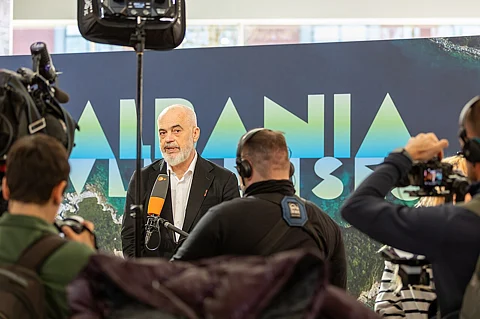

Albanians cast ballots in parliamentary elections on Sunday, with Prime Minister Edi Rama aiming for an unprecedented fourth consecutive term. The campaign was marked by competing pledges to secure European Union membership and persistent accusations of corruption.
Rama, 60, has led the Socialist Party (PS) since 2013 and is widely expected to defeat his longtime rival, Sali Berisha of the Democratic Party (PD). Berisha, an 80-year-old former president and prime minister, has seen his influence wane amid a U.S. corruption probe, though he denies wrongdoing.
Opinion polls suggest Rama could secure up to 50% of the vote, while Berisha trails with around 35%. However, analysts say the Socialists may need coalition support to maintain their narrow four-seat majority in the 140-member parliament. Final results are expected Monday.
Rama has centered his campaign on Albania’s EU aspirations, vowing to achieve membership by 2030. Last October, he secured the start of formal accession talks—a milestone he has leveraged to rally support. His government has also touted infrastructure projects and justice reforms, alongside economic growth exceeding 4% annually since 2022, fueled by EU trade and a tourism surge outpacing regional peers.
Yet corruption remains a critical hurdle. EU foreign policy chief Kaja Kallas has urged Albania to intensify governance reforms, while critics accuse Rama of consolidating power and stifling opposition. His ally, Tirana Mayor Erion Veliaj, faces corruption charges—a case both men dismiss as politically motivated.
Berisha, meanwhile, has borrowed from U.S. political rhetoric, initially campaigning under the slogan “Make Albania Great Again” before shifting to “Grandiose Albania.” His party enlisted Republican strategist Chris LaCivita, a key figure in Donald Trump’s 2024 campaign. Despite his barred entry to the U.S. and U.K. over graft allegations, Berisha retains a loyal base, promising higher wages and anti-corruption measures.
For the first time, Albania’s diaspora—hundreds of thousands strong—was eligible to vote by mail, adding unpredictability to the race. Turnout stood at 13.15% by 10 a.m., slightly lower than in 2021.
Young voters, disillusioned with the decades-long dominance of Rama and Berisha, cite stark inequality and sluggish reforms. "We’re tired of the same faces," said one Tirana resident, echoing frustrations over Albania’s post-communist stagnation.
Polls closed at 7 p.m., with exit surveys to follow. As the count begins, the question remains whether Rama can deliver on his EU pledge—or if Albania’s entrenched challenges will persist.